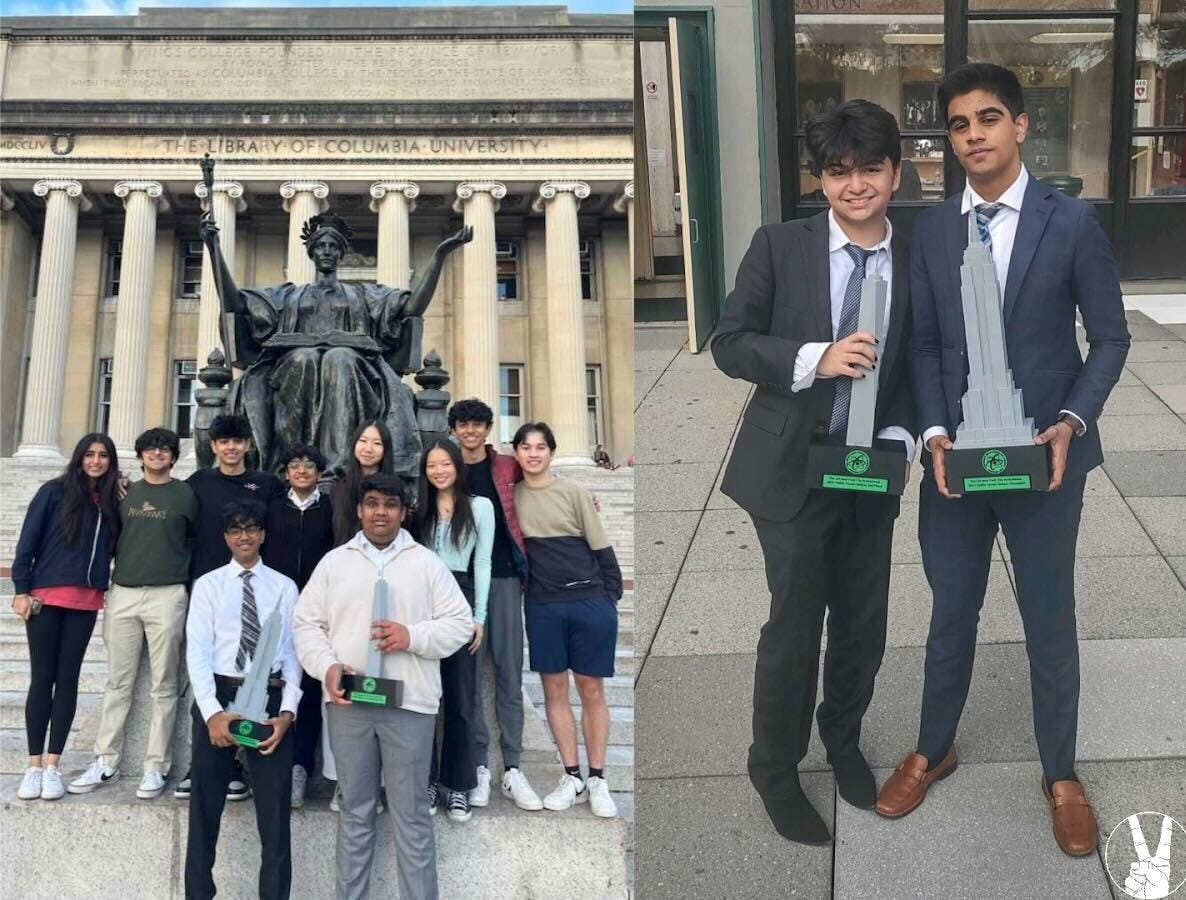10/11-10/18: LD & PF Tournament Results and the Case Against Non-Resolutional Theory
Lincoln Douglas Debate
Tournament Results
This weekend, LD debaters competed at the Heart of Texas Invitational and the New York City Invitational.
Congratulations to Marlborough’s Wyeth Renwick for championing the Heart of Texas Invitational. In finals, Wyeth defeated Harker’s Panav Gogte on a 3-0 decision (Beutelspacher, Jones, Myers). Additional congratulations to Harker’s Roshan Amurthur for being the top speaker.
Full pairings and results can be found here.
Congratulations to Westridge’s Tanya Wei and San Mateo’s Yesh Rao for co-championing the New York City Invitational. In semifinals, Tanya defeated Lake Highland Prep’s Wali Hasan on a 3-0 decision (Pein, Berg, Dua) and Yesh defeated Durham’s Sachin Aggarwal on a 3-0 decision (Lamberson, Shah, Baughman). Additional congratulations to Prospect’s Sophia Tian for being the top speaker.
Full pairings and results can be found here.
Public Forum Debate
Tournament Results
This weekend, PF debaters competed at two bid tournaments: the New York City Invitational and the California State University Fullerton tournament. Here are some notable results:
Congratulations to Nikhil Reddy & Vivek Yarlagedda from Southlake Carroll and Aidan Krishnaney & Zaid Ashruf from University for co-championing the 2023 New York City Invitational. Additional congratulations to JR Masterman’s Henry Anastasi for being the top speaker.
Full pairings and results can be found here.

Congratulations to Sudeep Vattikuti & Rejul Guru from BASIS Peoria for championing the 2023 California State University Fullerton tournament. In finals, they defeated Katherine Xue & Grace Li from Richard Montgomery on a 2-1 decision (Lundy*, Ayyala, Martinez). Additional congratulations to Lambert’s Jeffrey Guan for being the top speaker.
Full pairings and results can be found here.
Best of luck to everyone competing next weekend! Stay tuned for future tournament results.
November/December Briefs Are Now Available
November/December briefs are now available to download for both PF and LD. If you've already purchased the briefs, or they are included in your membership, you can download them by logging into your account at classroom.victorybriefs.com.
The public forum topic is “Resolved: The United States federal government should forgive all federal student loan debt.”
The Lincoln-Douglas topic is “Resolved: The United States ought to prohibit the extraction of fossil fuels from federal public lands and waters.”
If you want to purchase the briefs or subscribe to a year-long membership, click here.
The Case Against Non-Resolutional Theory
by Amadea Datel
You’ve probably heard the words “arbitrary, self-serving, and infinitely regressive” against most contrived theory interpretations in LD, including spec shells, counterplan theory, and meta-theory. However, debaters often struggle to explain and implicate these arguments – what makes an interpretation arbitrary? Isn’t all theory self-serving? What’s the impact to infinite regress? In this article, I’ll answer these questions by presenting a case against non-resolutional theory: theory that is not derived from the resolution, which includes almost all theory arguments, barring topicality and aff framework versus Ks.
A Defense of Normsetting
Making a case against non-resolutional theory first requires establishing that the purpose of theory is to set norms rather than to check in-round abuse. The normsetting model brings the added benefit that voting for a good norm will resolve the abuse that has occurred in a particular round. However, a paradigm that assumes that the purpose of theory is to check in-round abuse cannot answer the argument that theory rewards the better theory debater, not the debater who is right on a question (because winning a debate on the flow is more of a measure of skill level than of an argument’s truth value). This argument does not mean that all theory becomes pointless because debaters converge on the best norms over time since the fact that an interpretation loses time and time again seems to indicate that it is a bad argument, not that all the debaters who defended it were worse than their opponents. Yet because determining whether a practice is good requires tens if not hundreds of debates, we should evaluate them not within the context of individual rounds but in terms of their implications for debate in general.
Perhaps some will argue that individual theory debates should not reward the better theory debater because judges should not evaluate these rounds on the flow but use a reasonableness standard – the most plausible interpretation of reasonability but one that cannot overcome the arbitrariness objection: that judges should not decide theory debates on personal whims given that they have different (and thus unpredictable) opinions on debate practices, which turns rounds into coin flips that are unfair to the debaters.
Independently, it’s impossible to prove that abuse has occurred within a round because one cannot determine whether a skill differential or structural issue inherent to an argument was responsible for one side winning. For example, was the aff’s no link argument a reflection of smart debating or of a structural skew that made it impossible for the neg to win? Did the aff drop the three counterplans in the 1AR because the neg wrote a strategic 1NC or because conditionality created an unwinnable 1AR? To resolve this concern, debaters should make arguments about the structural problems associated with specific practices – that is, arguments that identify issues consistent across rounds – which suggests a normsetting paradigm. (As a side note, though, I do believe it is near-impossible to do this without resorting to substantive indicts of the argument e.g. “PICs are bad because they steal the aff” or “process CPs are bad because they’re not germane to the topic” are unwarranted shortcuts for claiming those counterplans should lose to competition.)
I’ve heard people refute the normsetting model by arguing that judges seem to assume that theory debate matters in rounds that do not set norms e.g. prelim rounds with no spectators or practice rounds, suggesting that in-round abuse must bear some relevance. However, the idea that the purpose of theory is to set norms does not entail that every round must contribute to normsetting – once we've agreed that theory matters because of its normsetting potential, we can agree that theory is a legitimate debate argument, in a similar manner that we often follow rules that we have determined will promote the best outcomes even if following the rule in a particular instance does not lead to that outcome (think rule utilitarianism).
The Normsetting Paradigm is Incompatible with Non-Resolutional Theory
Under the assumption that the purpose of theory debate is to set norms, non-resolutional theory falls apart because arguments not based on the resolution are impossible to predict, which cannot create a stable model of debate. The resolution guides pre-round preparation since it is the one stasis point available to both debaters before the round, so debaters can predict topicality objections but not arguments that the neg may read one but not two conditional counterplans or that the aff must specify the actor but not the enforcement mechanism.
People might argue that debaters should know whether their practices were abusive ahead of time since some strategies (e.g. reading ten conditional counterplans) will be subject to more scrutiny than others (e.g. reading an unconditional counterplan). However, as stated above, debaters have different beliefs about which practices they consider unfair, which becomes apparent when scanning paradigms from a typical judge pool: you’ll find a range of opinions, from some judges who believe that all counterplans should be unconditional to others who believe infinite conditionality is good, to others who draw the line somewhere between the two extremes. Even if we can agree that some 1NCs might be objectively harder to respond to than others, that is not a good measure of whether a debater should expect to lose to theory.
That means that non-resolutional theory cannot set norms because if debaters have no clue whether their strategies are abusive and will face theoretical objections, they will not adhere to interpretations that would be good for debate. Moreover, the unpredictable nature of non-resolutional theory means that debaters will never be prepared to defend their model and will lose to the new interp of the week, making the practice of initiating theory more abusive than the practice the shell criticizes – and also preventing theory from checking in-round abuse (to whatever end you still believe that matters). This argument is also an independent justification for a normsetting model since it concludes that theory arguments must be consistent over time, meaning we should not evaluate them on a case-by-case basis.
Counterarguments
People might raise two counterarguments against this model:
First, they might argue that non-resolutional theory can set norms, citing open-source disclosure. However, theory was not necessary to establish disclosure as a norm, given that college policy debaters seem to disclose just as well if not better than LDers while never reading disclosure theory; that is, we can converge on norms about debate (open-source disclosure good, clipping bad, and evidence ethics bad) as a community without relying on theory. Further, these examples comprise a tiny percentage of all non-resolutional theory (and even of disclosure debates, most of which occur over more nuanced interpretations that have not set norms), so such exceptions do not negate the general principle that non-resolutional theory is bad.
Second, debaters might worry about not having a check against abuse practices, but the resolution and strategic incentives provide enough of a resource. Concerned about severance perms? Those do not meet the aff’s burden of proving the resolution true. Concerned about word PIKs? That’s a reason you should read framework; if you assume that the neg can derive links from representations, PIKs should be legitimate because links determine competition, so it seems illogical to apply a different standard for competition than for links. Concerned about ten conditional counterplans? That would likely backfire against the neg since they would not have the time to make a complete argument for each one in the 1NC, and late-breaking debates favor the aff. Yet regardless of whether a particular strategy might make debate harder for one side, it seems difficult to justify excluding it via arbitrary, ex-post facto rules on which no consensus exists.
Conclusion
I understand the strategic value of theory – due to its arbitrary nature, it becomes almost unbeatable when you know how to effectively defend paradigm issues like competing interps, drop the debater, and no RVIs against debaters who do not question the assumptions or purpose behind theory debates. Yet against debaters who know how to indict non-resolutional theory as a model, such interps should almost always lose.
Amadea Datel is a senior at Dartmouth College who debated college policy at both Columbia and Dartmouth. She reached the quarterfinals at the Gonzaga Jesuit Debates and won the University of Minnesota College Invitational, the Crowe Warken Debates at USNA, and the Mid America Championship, ranking as the 25th team nationally her sophomore year. In high school, she built and coached her school’s LD debate team, won several tournaments in Massachusetts, and was the top speaker and a semifinalist at the MSDL State Championship and the first student from her school to qualify for NSDA and NCFL Nationals, clearing at the former. She is currently the Co-Director of LD and Newsletter Editor at the Victory Briefs Institute and an Assistant Coach at Apple Valley High School.







